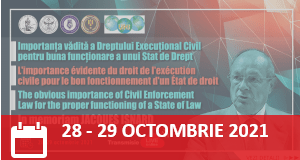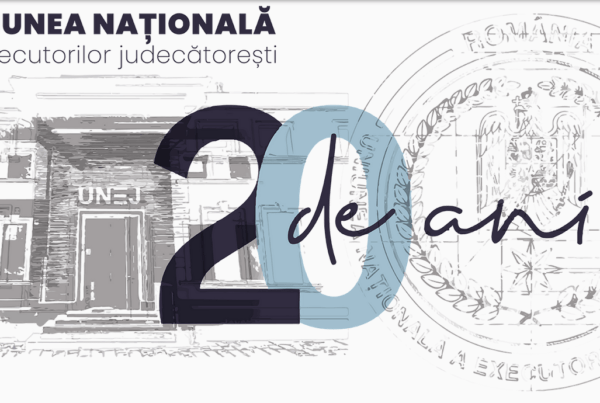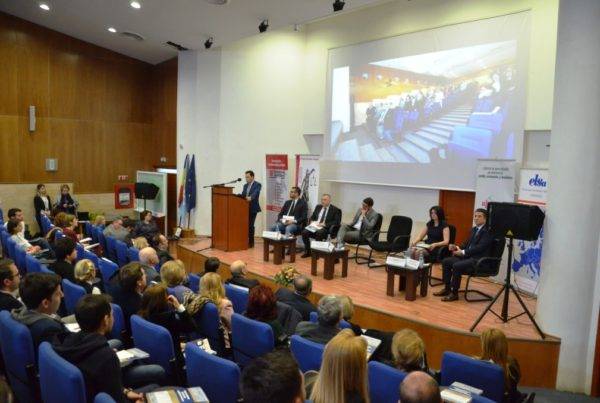This colloquium was organised by the “Ovidius” University of Constanţa, the “George Emil Palade” University of Medicine, Pharmacy, Science and Technology of Targu Mures, the “Titu Maiorescu” University of Bucharest, the UIHJ, the National Union of Judicial Officers of Romania, and the National Centre for Training and Improvement of Judicial Officers of Romania. It was dedicated to the memory of Jacques Isnard, past President of the UIHJ.
Due to the Covid-19 pandemic, the conference, initially organised face-to-face, had to be held online at the last minute. It brought together 150 participants. The UIHJ was represented by Marc Schmitz, President, Mathieu Chardon, First Vice-President, Jos Uitdehaag, Secretary, Patrick Gielen, member of the Innovation team, and Françoise Andrieux, Honorary President.
During the opening of the conference, Adrian Stoica, Professor of Law, Dean of the Faculty of Law and Administrative Sciences of the “Ovidius” University of Constanţa, welcomed all participants. He thanked the universities which showed their interest in this international conference, the UIHJ and the National Union of Judicial Officers of Romania, as well as the National Centre for Training and Improvement of Judicial Officers of Romania. He spoke of the work of Jacques Isnard whose memory he praised, and which inspired him for the topic of his doctoral thesis in Sibiu in 2001. He mentioned the international conference in Sibiu initiated by President Isnard in 2009, 10 years after the European summit in Tampere establishing the creation of an European area of freedom, security, and justice. Twelve years later, he noted that Jacques Isnard’s work is enduring through this conference, the objective of which is to determine whether the autonomy of enforcement law is recognised through three components: organic and systemic regulation, a law subject to its own rules and an autonomous law.
Daniel Stefan, Professor, Dean of the Faculty of Economics and Law of the “George Emil Palade” University of Medicine, Pharmacy, Science and Technology of Targu Mures, underlined the importance of this conference which commemorates Jacques Isnard, whose fame is very great in Romania.
Manuela Tabaras, rofessor, Dean of the Law Faculty of the “Titu Maiorescu” University of Bucharest, thanked the organisers and underlined the importance of the theme, which represents a challenge for the rule of law in a context of pandemic where many activities are affected.
Sebastian Spinei, Professor, Dean of the Law Faculty of the “Lucian Blaga” University of Sibiu, addressed his greetings to Dean Ioan Leș, who paid great attention to forced execution, a subject whose importance is evident today.
Nicolae-Horia Tit, Senior Lecturer, Vice-Dean of the Law Faculty of “Alexandru Ioan Cuza” of the University of Iasi, thanked Dean Stoica for his invitation. He spoke about the great dynamics of enforcement law that attracts the attention of many students.
Marius Iacob Morari, President of the National Union of Judicial Officers of Romania, greeted all the participants. He expressed his gratitude for the work accomplished by Jacques Isnard. He recalled that the judicial officer is an element of the rule of law. He also said that public opinion has changed favourably regarding the enforcement of court decisions since recent reforms.
Eugen Huruba, Professor, Director of the National Centre for Training and Improvement of Judicial Officers of Romania, in turn greeted the memory of Jacques Isnard. He recognised a direct link between the conference theme and the personality of President Isnard, who was the promoter of the idea of the liberalisation of the profession, since 1997 during his visit to Romania. Twenty years later, he notes that the links between the UIHJ and the National Union of Judicial Officers are extraordinary, which honours the profession of judicial officer in Romania. He expressed his gratitude to Jacques Isnard and the UIHJ.
Marc Schmitz thanked the conference organisers for inviting the representatives of the UIHJ and its experts and for dedicating the conference to the memory of Jacques Isnard. He confirmed that President Isnard was very committed to the profession of judicial officer in Romania. He referred to the 2007 Bucharest Permanent Council during which he welcomed the great advances of the Romanian judicial officers. He recognised that the pandemic has highlighted the fragility of the profession of judicial officer and the need to develop it, to make it sustainable, through training and by being fully in line with the digital revolution process of Justice, while retaining its human aspect in his capacity as an interface between the citizen and the judge, to ensure a balance between the rights of the creditor and those of the debtor. He spoke of a rapidly changing profession around the world. He announced that the Global Code of Digital Enforcement would be presented during the International Congress of Judicial Officers to be held in Dubai from 23 to 25 November 2021.
During two very dense days, interventions followed one another around four topics:
- The principles of civil enforcement law;
- Civil enforcement law actors and their responsibility;
- Opposition to enforcement and other legal actions specific to the civil enforcement law;
- The modalities and forms of enforcement corresponding to the civil enforcement law.
Regarding the first topic, Marin Voicu, Professor Honoris Causa of the Faculty of Law and Administrative Sciences of the “Ovidius” University of Constanţa, spoke about the status of the profession of judicial officer. Ioan Leș, Professor Honoris Causa of the “Lucian Blaga” University of Sibiu, past member of the Scientific Council of the UIHJ, discussed the possible remedies against the forced execution. Patrick Gielen presented enforcement law in the light of the European Convention on Human Rights. Guillaume Payan, Professor at the Law Faculty of the University of Toulon (France), Director of the Legal Unit of the UIHJ, mentioned the rules concerning enforcement in Europe, between innovations and shattered hopes. Teodor Bodoasca, Professor, President of the “Dimitrie Cantemir” University of Târgu-Mureș, discussed the place of property in the Civil Code. Adrian Stoica discussed the right to a good judgment and the right to a good enforcement, autonomous rights to a fair trial.
Regarding the second topic, Evelina Oprina, Professor, Judge at Ilfov court, explained the role of the court in the context of forced execution. Vasile Bozeșan, Judge at the Ilfov court, insisted on emphasising the fundamental principles in concrete situations of forced execution. Jos Uitdehaag spoke about the role and responsibilities of the parties in the enforcement process. Vasile Drăghici, Professor at the Law Faculty and Administrative Sciences of the “Ovidius” University of Constanţa, spoke about the particularities of abuse of power, with particular attention to the activity of the judicial officer.
Regarding the third topic, Natalie Fricero, Professor Honoris Causa of the University of Nice (France), member of the Superior Council of the Judiciary (France), member of the Scientific Council of the UIHJ, reviewed the recent case law of the European Court of Human Rights in matters of enforcement. Françoise Andrieux examined the appeals against enforcement, discussing the existing possibilities in domestic law and in Community matters. Ioan Garbulet, Professor, Judge at the Court of Appeal of Targu Mures, spoke about the admissibility of the intervention of the tax creditor in enforcement proceedings. Bogdan Dumitrache, Judicial Officer, National Centre for Training and Improvement of Judicial Officers of Romania, presented the active role of the enforcement agent in his capacity as a simple correspondent and during the forced execution phase , given the active role of the judge.
Regarding the fourth topic, Marc Schmitz presented the attachment of digital assets, a real challenge for judicial officers and the State. Mathieu Chardon addressed the issue of enforcement costs and associated expenses. Cristina Duta, Senior Lecturer at the Law Faculty of the “Ovidius” University of Constanţa, discussed compulsory enforcement in tax matters arising from special measures of seizure of property in criminal matters, as well as issues of prescription of debts, and privileged claims of the State in tax matters. Roxana-Maria Roba, Senior Lecturer at the “Petru Maior” University of Targu Mures, spoke about the considerations regarding the enforcement of court decisions in labour disputes. Finally, Eugen Huruba touched on the aspects relating to the admission of the request for enforcement and the authorisations of enforcement
At the end of these two extremely rich and perfectly organised days, after the concluding remarks of Marius Iacob Morari and Marc Schmitz, Adrian Stoica summarised the works, thanked all the participants and specified that the work would be the subject of a publication. He ended his remarks by once again saluting the memory of President Isnard.






